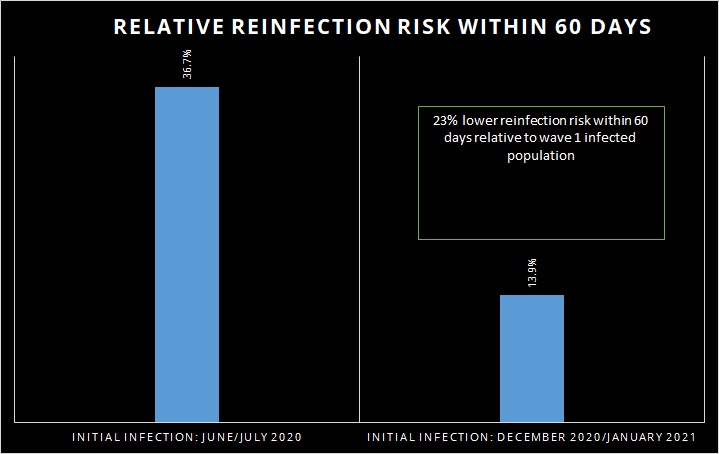Investigating risk of COVID-19 reinfection and comparison of reinfection risk over first, second and third waves of COVID-19

Discovery Health has investigated the relative risk of a second COVID-19 infection - possible reinfection - 90 days after recovering from a first bout of COVID-19. The resulting analysis (of administered medical scheme member data) shows an 80% decrease in relative reinfection risk. Also, the risk of reinfection has decreased with each successive wave of COVID-19 infection in South Africa.
Authors
Shirley Collie (Chief Health Analytics Actuary) and Lizelle Steenkamp (Head of Risk Intelligence)
The recently published results of the British SIREN studyi (which considered COVID-19 infection rates among healthcare workers) showed that individuals who recovered from a SARS-CoV-2 (the virus that causes COVID-19) infection had an 16% relative risk (RR) of reinfection. This study looked at reinfection within the 90-day period after recovery from the first infection.
Similarly, a Danish population studyii estimated the RR of reinfection in people who had recovered from COVID-19, of approximately 17% to 20% in people younger than 65 years, and 53% amongst those aged 65 years and older. This study also looked at reinfection within the 90-day period after recovery from the first infection.
It is clear that high levels of natural immune-derived protection from reinfection with COVID-19 are being reported in Europe.
- Can we expect similar dynamics in South Africa?
- How is the local experience impacted by the beta variant that drove the second wave of infection at the end of 2020 and early 2021, and the delta variant driving the third wave of infection in mid-2021?
Discovery Health's data: 20% relative possible reinfection risk within 90-day period post recovery from first infection
According to Discovery Health's data, the relative risk (RR) of COVID-19 reinfection 90-days after recovery from a previous bout of infection is at 20%, among administered medical scheme members. This, compared to the overall risk of reinfection among medical scheme members who have never tested positive for COVID-19.
In other words a member's relative risk of reinfection with COVID-19, 90 days post recovery from a first infection, is 80% lower than the risk of contracting COVID-19 faced by members who have never had the disease before.
- "Relative risk" of possible reinfection is defined as an individual member's risk of COVID-19 reinfection relative to other medical scheme members who are contracting COVID-19 for the first time
- Possible reinfection" is defined as a positive PCR test 90 days or more since recovery from a previous COVID-19 infection.
- Reinfections are considered confirmed, if supported with viral genomic data from both episodes of infection and quantitative serological investigations. As this data is not available, for the pupose of the article below, reinfection risk from Discovery's data, refers to possible reinfection risk.
- "Recovery" is based on the National Institute for Communicable Diseases definitioniii of 14 days since receiving a positive PCR test result or 14 days since discharge from hospital for COVID-19 related treatment.
Further notes:
- The time frame considered in this analysis was based on individuals who had their first infection between June 2020 to January 2021, so takes South Africa's first wave and a part of the second wave of infection into account.
- No medical scheme member included in the analysis had received a COVID-19 vaccine at the time of data sampling
RR of reinfection and admission to hospital varies according to the wave of infection in which a member contracts COVID-19
Discovery Health's data indicate that the RR of COVID-19 reinfection (within a 60-day window that follows the 90-day period post recovery from a first COVID-19 infection) is lower during the country's third wave of infection than in the second wave of infection.
In other words, we see better cross protection in scheme members who recovered from a COVID-19 infection that was very likely linked to the Beta variant (we safely assume second wave infections are linked to the Beta variant as it was dominant during South Africa's second wave of COVID-19 infection), than from earlier COVID-19 viral variants (in circulation during the country's first wave of infection).
- "Cross protection" refers to immunity that follows recovery from COVID-19 offers partial protective against infection with different COVID-19 viral strains.
South Africa's third wave of infection, officially confirmed by the NICD on 10 June 2021iv, has been driven by the Delta variant.
In more detail (and as indicated in Figure 1), the RR of reinfection in the 60 window following a 90-days period after recovery from a first COVID-19 infection, is:
- 36.3% for individuals who first contracted COVID-19 in wave one and then contracted the disease for a second time during South Africa's second wave of infection
- (23% lower at) 13.7% for individuals who first contracted COVID-19 during wave two and then contracted the disease for a second time during South Africa's third wave of infection

Figure 1: Comparison of relative risk of COVID19 infection for 90 days since recovery from COVID-19 across COVID-19 wave
Risk of severe illness and hospital admission in the case of COVID-19 reinfection
Discovery Health has also looked into the likelihood of admission to hospital across each wave of infection.
The data show that the RR of admission to hospital for medical scheme members who are reinfected with COVID-19 (in the 60-day window following the 90-day period after recovery from a first COVID-19 infection) is consistent with the findings of RR levels of reinfection between waves of infection.
As one's RR of reinfection reduces with each wave of infection, one's risk of a second bout of COVID is indeed decreased with each wave.
However, our data show that for those scheme members who test positive for COVID-19 for a second time (again, in the 60-day window following the 90-day period after recovery from a first COVID-19 infection), the likelihood of admission to hospital is similar to that faced by individuals who contract COVID-19 for the first time.
( Considering mortality risk)
Whilst we observe a very similar risk of hospital admission to treat reinfections relative to initial infections, it is encouraging that the mortality risk faced by people who have contracted COVID-19 for a second time is 63.5% lower than the mortality risk faced by scheme members who are recovering from their first infection.
Adherence to preventive measures remains a must
This data analysis shows that the risk of reinfection remains a reality despite the protection conferred by natural immunity levels post a first infection. Therefore, all in all, regardless of whether an (unvaccinated) individual has recently recovered from a COVID-19 infection, it is imperative that they continue adherence to the non-pharmaceutical, preventive measures that limit their COVID-19 exposure risk.
iV J Hall, S Foulkes, A Charlett et al. SARS-CoV-2 infection rates of antibody-positive compared with antibody-negative health-care workers in England: a large, multicentre, prospective cohort study (SIREN) Lancet Infect Dis. 2021; 397: 1459-1469
iiC Hansen, D Michlmayr, S Gubbels et.al Assessment of protection against reinfection with SARS-CoV-2 among 4 million PCR-tested individuals in Denmark in 2020: a population-level observational study The Lancet. 2021; 397: 1204-1212
iiihttps://www.nicd.ac.za/wp-content/uploads/2020/05/COVID_Recovered-Definition.pdf
ivnicd.ac.za/latest-confirmed-cases-of-covid-19-in-south-africa-10-june-2021 /
Please contact us on MEDIA_RELATIONS_TEAM@discovery.co.za to request any updated data available since publication and any further context required.
All information shared on this page is based on perspectives gained from analysing data acquired by Discovery Ltd and its various affiliate entities (Discovery). The analysis, which is conducted by Discovery's actuarial and data science team, aims to encourage industry dialogue. Publications containing our analyses are shared for educational and informational purposes only. Each publication reflects only the data available for analysis at the time of publication. It does not, unless otherwise indicated, constitute peer-reviewed, published scientific research, and hence should not be interpreted as such or used as a basis for altering treatment decisions. While every effort has been made to ensure the accuracy of the content conveyed, we cannot be held liable or responsible for any actions or decisions taken based on the information shared in this article.